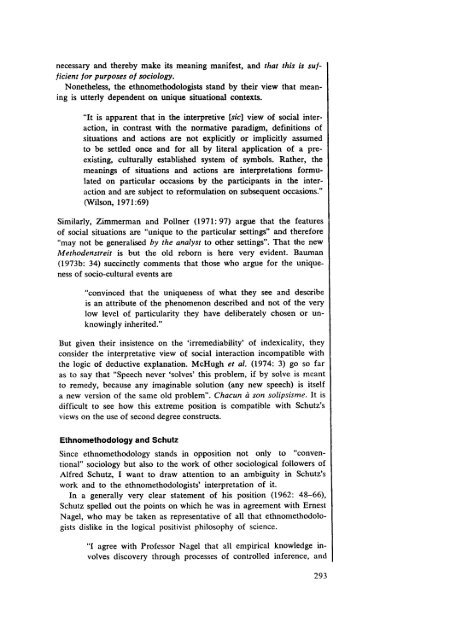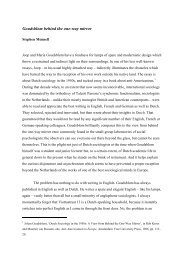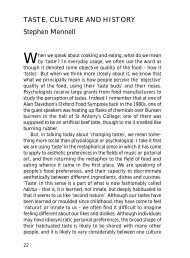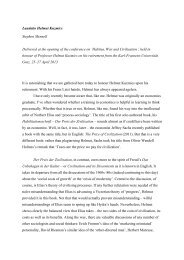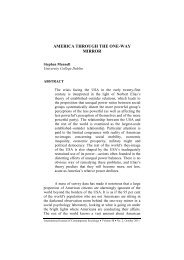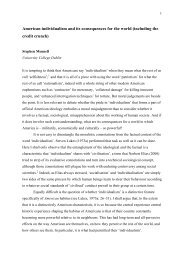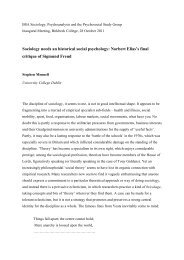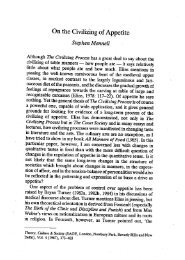Ethnomethodology and the New "Methodenstreit" - Stephen Mennell
Ethnomethodology and the New "Methodenstreit" - Stephen Mennell
Ethnomethodology and the New "Methodenstreit" - Stephen Mennell
Create successful ePaper yourself
Turn your PDF publications into a flip-book with our unique Google optimized e-Paper software.
necessary <strong>and</strong> <strong>the</strong>reby make its meaning manifest, <strong>and</strong> that this is sufficientfor purposes of sociology.None<strong>the</strong>less, <strong>the</strong> ethnomethodologists st<strong>and</strong> by <strong>the</strong>ir view that meaningis utterly dependent on unique situational contexts."It is apparent that in <strong>the</strong> interpretive [sic] view of social interaction,in contrast with <strong>the</strong> normative paradigm, definitions ofsituations <strong>and</strong> actions are not explicitly or implicitly assumedto be settled once <strong>and</strong> for all by literal application of a preexisting,culturally established system of symbols. Ra<strong>the</strong>r, <strong>the</strong>meanings of situations <strong>and</strong> actions are interpretations formulatedon particular occasions by <strong>the</strong> participants in <strong>the</strong> interaction<strong>and</strong> are subject to reformulation on subsequent occasions."(Wilson, 1971:69)Similarly, Zimmerman <strong>and</strong> Pollner (1971: 97) argue that <strong>the</strong> featuresof social situations are "unique to <strong>the</strong> particular settings" <strong>and</strong> <strong>the</strong>refore"may not be generalised by <strong>the</strong> analyst to o<strong>the</strong>r settings". That <strong>the</strong> newMethodenstreit is but <strong>the</strong> old reborn is here very evident. Bauman(1973b: 34) succinctly comments that those who argue for <strong>the</strong> uniquenessof socio-cultural events are"convinced that <strong>the</strong> uniqueness of what <strong>the</strong>y see <strong>and</strong> describeis an attribute of <strong>the</strong> phenomenon described <strong>and</strong> not of <strong>the</strong> verylow level of particularity <strong>the</strong>y have deliberately chosen or unknowinglyinherited."But given <strong>the</strong>ir insistence on <strong>the</strong> 'irremediability' of indexicality, <strong>the</strong>yconsider <strong>the</strong> interpretative view of social interaction incompatible with<strong>the</strong> logic of deductive explanation. McHugh et al. (1974: 3) go so faras to say that "Speech never 'solves' this problem, if by solve is meantto remedy, because any imaginable solution (any new speech) is itselfa new version of <strong>the</strong> same old problem". Chacun a son solipsisme. It isdifficult to see how this extreme position is compatible with Schutz'sviews on <strong>the</strong> use of second degree constructs.<strong>Ethnomethodology</strong> <strong>and</strong> SchutzSince ethnomethodology st<strong>and</strong>s in opposition not only to "conventional"sociology but also to <strong>the</strong> work of o<strong>the</strong>r sociological followers ofAlfred Schutz, I want to draw attention to an ambiguity in Schutz'swork <strong>and</strong> to <strong>the</strong> ethnomethodologists' interpretation of it.In a generally very clear statement of his position (1962: 48-66),Schutz spelled out <strong>the</strong> points on which he was in agreement with ErnestNagel, who may be taken as representative of all that ethnomethodologistsdislike in <strong>the</strong> logical positivist philosophy of science."I agree with Professor Nagel that all empirical knowledge involvesdiscovery through processes of controlled inference, <strong>and</strong>293


